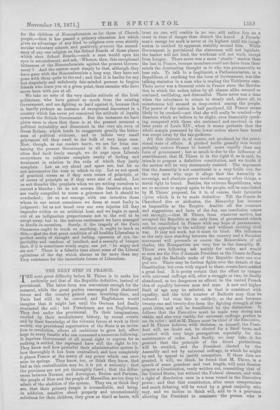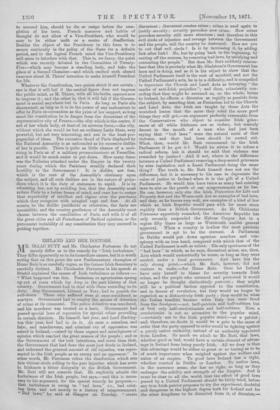THE NEXT STEP IN FRANCE.
THE next great difficulty before M. Thiers is to make his authority and that of the Republic definitive, instead of provisional. The latter form was convenient enough for the moment, while the great parties rearranged their shattered forces and the country gained some breathing-time, and Paris had still to be coerced, and Englishmen would imagine that it might last until the German had finally evacuated the soil ; but Frenchmen are not Englishmen. They fret under the provisional. To their imaginations, excited by their revolutionary history, by recent events, and by their knowledge of the volcanic forces at work in their society, any provisional organization of the State is an invita- tion to revolution, allows all ambitions to grow hot, offers hope to every fanatic who can command a numerous following. It deprives Government of all moral right to repress, for as nothing is settled, the repressed have still the right to try. They know well how powerful their administrative system is, how thoroughly it has been centralized, and how completely it places France at the mercy of any power which can once seize its springs. They know, too, or think they know, that bad as this centralization may be, it is yet a necessity ; that the provinces are not yet thoroughly fused ; that the differ- ences between Norman and Auvergnat, Breton and Parisian, • the people of Nice and the people of Marseilles, are too deep to admit of the abolition of the system. They see, or think they 800, that their primary danger is irremediable, and being, in addition, sensitive about property and unconscionably solicitous for their children, they grow as timid as hares, will
trust no one, will confide in no one, will rather live on a crust in time of danger than disturb the hoard. A French- man's energy for work is never at its highest until his imagi- nation is soothed by apparent stability around him. While Government is provisional the statesman will not legislate, the banker will not lend, the workman will not work, except from hunger. There never was a more "sterile" session than the last in France, because members could not drive from their minds the dominating thought as to who was permanently to bear rule. To talk to a Legitimist, a Parliamentarian, or a Republican of anything but the form of Government, was like talking statistics to a man who is reading the Tichborne case. There never was a financial crisis in France since the Revolu- tion in which the action taken by all classes alike seemed so confused, vacillating, and distrustful. There never was a time when the reluctance to return to steady and, above all, to monotonous toil seemed so deep-rooted among the people. The power of the nation is half paralyzed, till France seems likely to be crushed—not that she will really be crushed—by disasters which we believe to be slight, even financially speak- ing, compared with those she sustained and survived in the later years of Louis XIV., when it seems probable that the whole margin possessed by the lower orders above bare bread was swept away by the tax-gatherer.
All this distrust is, of course, not produced by the provi- sional state of affairs. A pitched battle grandly won would probably restore France to herself more rapidly than any form of government ; but so much is duo to the influence of unsettlement, that M. Thiers is in the right if, as is said, he intends to propose a definitive constitution, and we doubt if the motion will be very strenuously resisted. The argument that the Assembly is not constituent is a very futile one, for the very men who urge it allege that the Assembly ia sovereign, and absolute power involves, among other things, o moral right to found. Besides, the extreme Republicans, who are so anxious to appeal again to the people, will be conciliated by M. Thiers' proposal, for it is, of course, their favourite
giine which is to be made definitive. Till the Comte de Chambord dies or abdicates, the Monarchy has become as impossible as the Empire. Amidst all the rumours and suggestions and facts of the day, one conclusion comes out strongly,—that M. Thiers, from whatever motive, has accepted the Republic as the only form of government which can be established in France with any hope of permanence, without appealing to the soldiery and without exciting civil war. It may not work, but it must be tried. His influence, as the only man standing between the country and a Socialist movement will persuade or coerce the Monarchists of all shades, the Bonapartists are very few in the Assembly, M. There' own following ask mainly for order, and would as soon see the Due d'Aumale President as the Comte de Paris King, and the Radicals make of the Republic their one sine qua non. There may be furious fights over the details of the Constitution, but even with regard to these, events have settled a great deal. It is pretty certain that the effort to tamper with universal suffrage will, after a struggle or two, be finally abandoned, as too dangerous an affront to the rooted French idea of equality between man and man. A new and higher limit of age may be selected, as that is consistent with equality, and the total number of Radicals may thus be reduced ; but even this is unlikely, as the men between twenty-one and twenty-five form the fighting strength of the great cities, and will be humiliated by the distinction. It follows that the Executive must be made very strong and stable, and also very visible, for universal suffrage prefers to see its ruler ; and as M. Thiers must be chief of the Executive, and M. Pliers believes, with decision, in himself, the Presi- dent will, we doubt not, be elected for a fixed term, and invested with very large prerogatives, especially for the maintenance of order. And finally, we may take it for
granted that the principle of the direct plebiscitum will be avoided, and the President elected by the Assembly and not by universal suffrage, to which he might by and by appeal to justify usurpation. If these data are granted, it will, we think, be found that M. Thiers, in a speech of some grandeur and vast length, will next Session propose a Constitution, ready written out, resembling that of the United States, but without the Federal element, and with
a right of dissolution once in a term vested in the Executive power ; and that this constitution, after some compromises and much debating, will be voted by a great majority, who may, and we incline to think will, add to it a provision allowing the President to nominate the person who is
to succeed him, should he die or resign before the com- pletion of his term. French manners and habits of thought do not allow of a Vice-President, who would be sure to be either 'unfit or a centre of disaffection. Besides the object of the Presidency in this form is to secure continuity in the policy of the State for a definite period, and to the logical French mind the Vice-Presidency will seem to interfere with that, This is, we fancy, the point which was recently debated in the Committee of Twenty- Five—which may become a standing body, and take the place of a Second Chamber—and which excited such absurd rumours about M. Thiers' intention to make himself President for life.
Whatever the Constitution, two points about it are certain ; one is that it will fail if the central figure does not impress the public mind, as M. Thiers, with all his faults, appears now to impress it ; and the other is, that it will fail if the Govern- ment is seated anywhere but in Paris. As long as Paris sits discrowned, as long as it is in the power of any malcontent to offer to Paris re-coronation as the price of her support, so long must the constitution be in danger from the discontent of the representative city of France,—the city which is the centre, if not of her whole body, at least of its nervous force,--the city, without which she would be but an ordinary Latin State, very powerful, but not very interesting, and not in the least pro- pagandist of ideas. The excessive dread of Paris displayed by the National Assembly is as unfounded as its excessive dislike of her is puerile. There is quite as little chance of a mob- rising in Paris as of a military pronunciamiento at Versailles, and it would be much easier to put down. How many times was the Tuileries attacked under the Empire in the twenty years during which the Parisians steadily declared their
hostility to the Government I It is dislike, not fear, which is the root of the Assembly's obstinacy upon the subject, and all such dislikes are in the nature of preju- dices which it is the duty of statesmen to avid. It is by educating her, not by avoiding her, that the Assembly must reduce Paris to a better frame of mind, and coax her to resign that superiority of intellect and vigour over the provinces which they recognize with mingled rage and fear. At all events, be the dislike justifiable or otherwise, the facts are irresistible, and the country gentlemen of the Assembly must choose between the conciliation of Paris, and with it of all the great cities and all Frenchmen of Radical opinions, or the permanent instability of any constitution they may succeed in putting together.



































 Previous page
Previous page